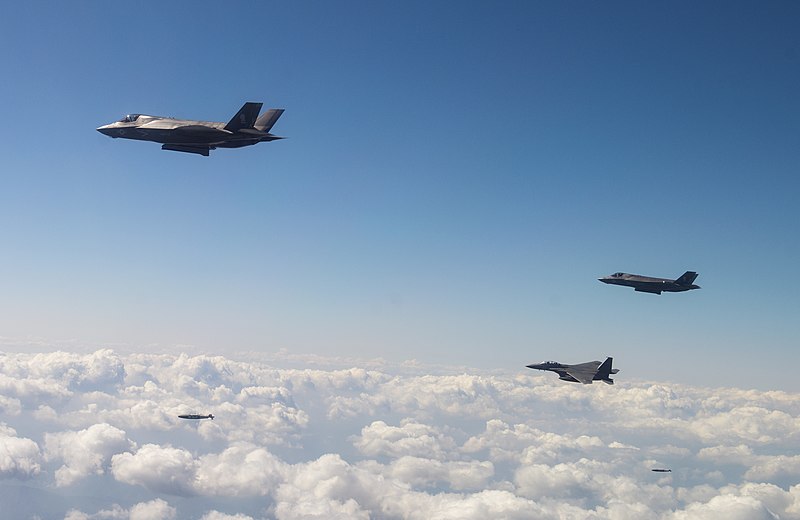The South Korean military was forced to scramble its jets following a transit that took place in its air defense zone. The jets were scrambled when Chinese and Russian warplanes were identified to have entered the country’s air defense zone.
Seoul’s Joint Chiefs of Staff said Wednesday that two Chinese and six Russian jets entered its air defense zone. Two Chinese H-6 bombers repeatedly entered and left the Korea Air Defense Identification Zone off the southern and northeastern coasts of South Korea. The planes entered the country’s air defense zone from the Sea of Japan or the East Sea, hours after the initial incursions with the Russian TU-95 bombers and SU-35 jets, leaving after 18 minutes.
The JCS noted that the planes did not breach South Korea’s airspace.
“Our military dispatched air force fighter jets ahead of the Chinese and Russian aircraft’s entry of the KADIZ to implement tactical measures in preparation for a potential contingency,” said the JCS in a statement.
Russia does not recognize South Korea’s air defense zone, and China said the zone is not territorial airspace and that countries should exercise their freedom of movement in the air. The Japanese Air Self-Defense Force was also prompted to scramble fighter jets after the Chinese bombers entered the airspace of the Sea of Japan from the East China Sea, according to the Japanese defense ministry.
China and Russia previously said that their aircraft were conducting joint exercises.
The transit follows another entry back in August when the JCS identified Russian warplanes entering the KADIZ, three months after Chinese and Russian jets entered the air defense zone back in May for the first time since President Yoon Suk-yeol took office.
Seoul is also currently facing a trucker strike after the South Korean government failed to make progress with truck drivers who defied the order to return to work amidst concerns about fuel shortage and increased prices of groceries. Officials from the South Korean transport ministry said that the government’s stance would not change.
The governing People Power Party told the union that represented 25,000 striking truck drivers that they must return to work before lawmakers decide on a bill on demands.



 Pentagon Ends Military Education Programs With Harvard University
Pentagon Ends Military Education Programs With Harvard University  Japan Election 2026: Sanae Takaichi Poised for Landslide Win Despite Record Snowfall
Japan Election 2026: Sanae Takaichi Poised for Landslide Win Despite Record Snowfall  Trump Allows Commercial Fishing in Protected New England Waters
Trump Allows Commercial Fishing in Protected New England Waters  New York Legalizes Medical Aid in Dying for Terminally Ill Patients
New York Legalizes Medical Aid in Dying for Terminally Ill Patients  Trump Backs Nexstar–Tegna Merger Amid Shifting U.S. Media Landscape
Trump Backs Nexstar–Tegna Merger Amid Shifting U.S. Media Landscape  U.S.-India Trade Framework Signals Major Shift in Tariffs, Energy, and Supply Chains
U.S.-India Trade Framework Signals Major Shift in Tariffs, Energy, and Supply Chains  Trump Signs “America First Arms Transfer Strategy” to Prioritize U.S. Weapons Sales
Trump Signs “America First Arms Transfer Strategy” to Prioritize U.S. Weapons Sales  US Pushes Ukraine-Russia Peace Talks Before Summer Amid Escalating Attacks
US Pushes Ukraine-Russia Peace Talks Before Summer Amid Escalating Attacks  TrumpRx.gov Highlights GLP-1 Drug Discounts but Offers Limited Savings for Most Americans
TrumpRx.gov Highlights GLP-1 Drug Discounts but Offers Limited Savings for Most Americans  Trump Allegedly Sought Airport, Penn Station Renaming in Exchange for Hudson River Tunnel Funding
Trump Allegedly Sought Airport, Penn Station Renaming in Exchange for Hudson River Tunnel Funding  U.S. to Begin Paying UN Dues as Financial Crisis Spurs Push for Reforms
U.S. to Begin Paying UN Dues as Financial Crisis Spurs Push for Reforms  Jack Lang Resigns as Head of Arab World Institute Amid Epstein Controversy
Jack Lang Resigns as Head of Arab World Institute Amid Epstein Controversy  Trump Signs Executive Order Threatening 25% Tariffs on Countries Trading With Iran
Trump Signs Executive Order Threatening 25% Tariffs on Countries Trading With Iran  U.S. Lawmakers to Review Unredacted Jeffrey Epstein DOJ Files Starting Monday
U.S. Lawmakers to Review Unredacted Jeffrey Epstein DOJ Files Starting Monday  Trump Endorses Japan’s Sanae Takaichi Ahead of Crucial Election Amid Market and China Tensions
Trump Endorses Japan’s Sanae Takaichi Ahead of Crucial Election Amid Market and China Tensions  Nighttime Shelling Causes Serious Damage in Russia’s Belgorod Region Near Ukraine Border
Nighttime Shelling Causes Serious Damage in Russia’s Belgorod Region Near Ukraine Border  U.S. Announces Additional $6 Million in Humanitarian Aid to Cuba Amid Oil Sanctions and Fuel Shortages
U.S. Announces Additional $6 Million in Humanitarian Aid to Cuba Amid Oil Sanctions and Fuel Shortages 































